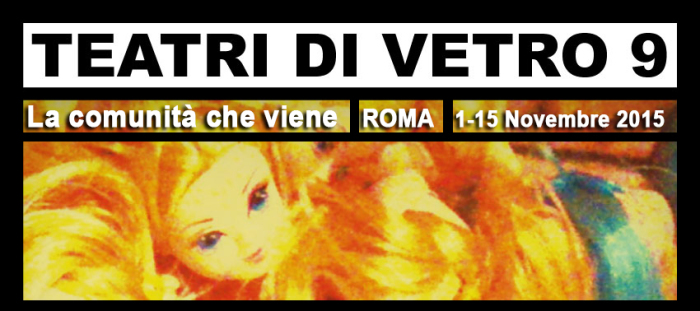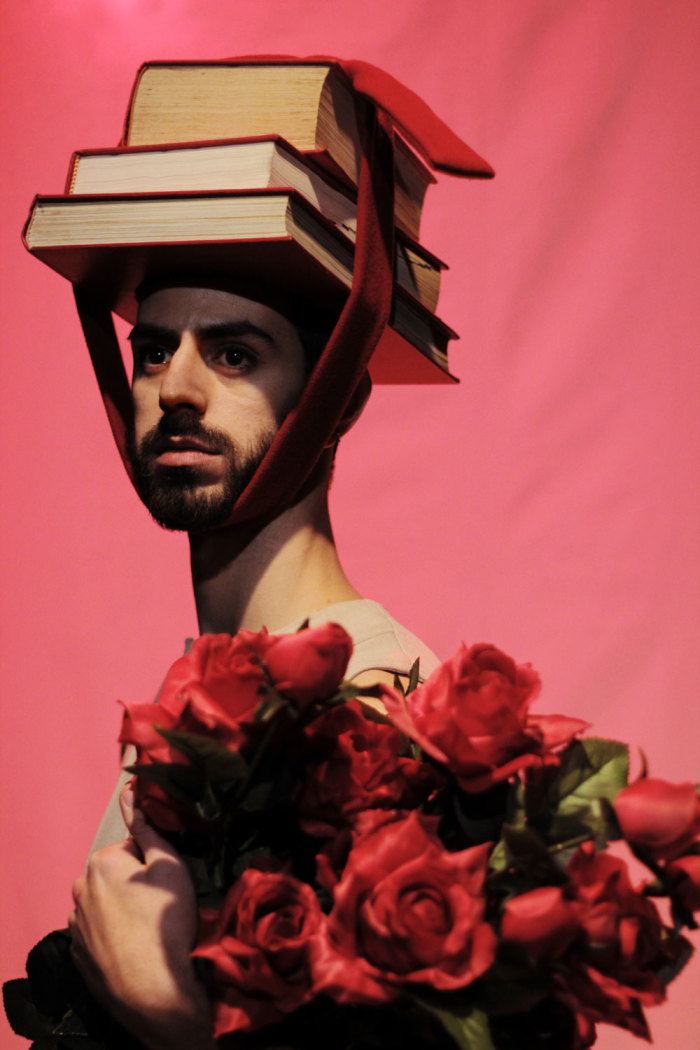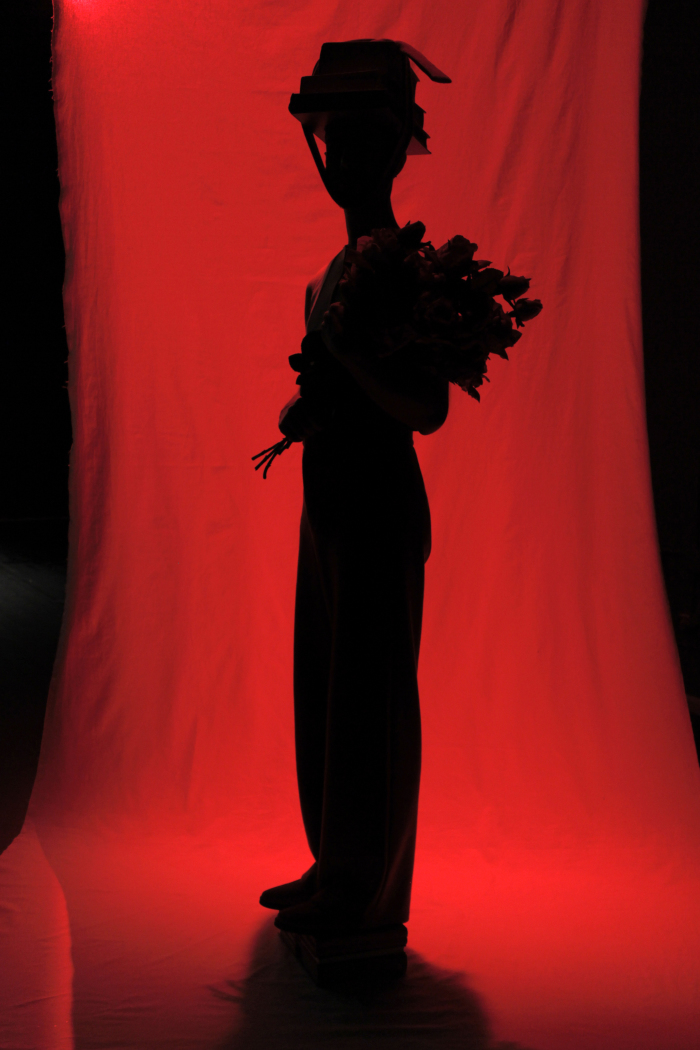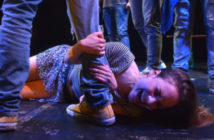* you can find the english version of this interview by scrolling down *
In occasione del festival Teatri di Vetro 2015 – TdV9 – che si svolgerà a Roma dall’1 al 15 novembre 2015 occupando spazi quali il Macro di testaccio, l’Opificio Romaeuropa, Carrozzerie N.O.T., il teatro Vascello, la redazione di Nucleo Artzine ha intervistato gli artisti ospiti di questa nuova edizione della rassegna di musica/danza/teatro che è alla sua nona edizione. Il titolo scelto dallo staff di TdV9 è “La comunità che viene”, che pone l’accento sul bisogno concreto di creare una comunità artistica a cui potersi rivolgere, che possa costruire continuamente spazi di creazione, ridefinendo il proprio terreno di lavoro e la propria pratica.
Miguel Bonneville, classe 1985, è un artista portoghese che struttura il proprio lavoro autobiograficamente. Attraverso processi di decostruzione e ricostruzione si interroga su concetti complessi che definiscono la libertà e l’identità, passando attraverso periodi di tempo differenti ed ispirandosi a diverse figure intellettuali che hanno condiviso o condividono la stessa modalità di ricerca.
L’importanza di essere Simone de Beauvoir è la performance che esprime le profonde affinità intellettive provate da Bonneville nei confronte della de Beauvoir e del suo lavoro, figura che in più occasioni artistiche è stata moto di altre creazioni.
Per altre info: Miguel Bonneville
1. Da dove nasce il lavoro che verrà proposto a Teatri di Vetro 9 e qual è stato il suo processo di creazione?
Il lavoro ha iniziato a prendere forma effettivamente nel 2008, quando ho letto il primo romanzo di Simone de Beauvoir L’invitata. A quel tempo stavo preparando un nuova performance, Miguel Bonneville #6, che ho presentato nel febbraio di quest’anno a Carrozzerie N.O.T., nella versione più piccola del festival Teatri di Vetro. Credo di essere stato influenzato molto dalla massima della de Beauvoir: ‘Non si nasce, ma piuttosto si diventa una donna’. Quella performance ha segnato il mio incontro con la de Beauvoir, il che significa che ha anche affinato la mia consapevolezza delle convinzioni politiche attraverso il femminismo. Ha anche affinato il mio rapporto con l’esistenzialismo e l’autobiografia; de Beauvoir sembrava davvero toccare ogni concetto che era importante per me; stavo approfondendo la scoperta di me stesso attraverso la vita e il lavoro di qualcun altro. Così Miguel Bonneville #6 è stato il primo passo consapevole al processo di divenire-donna (che può anche essere correlato al concetto di Deleuze e Guatarri di diventare una minoranza).
Dal 2008-2014 ho letto tutti i libri scritti da o su Simone de Beauvoir, ho guardato tutti i film e documentari che sono stati legati a lei e ho aspettato il momento perfetto per dare finalmente forma alle mie idee.
Nel 2013 ho iniziato una nuova serie di performaces chiamata L’importanza di essere. Ho deciso che volevo lavorare con un punto di partenza esterno, dal momento che avevo lavorato principalmente sulla mia vita. Pertanto, ho cominciato a scegliere artisti (scrittori, registi, musicisti) che mi avevano profondamente influenzato; il primo è stato il controverso regista portoghese António de Macedo, ed è così che questa serie è iniziata. Naturalmente la seguente performance doveva essere basata sulla vita e l’opera di Simone de Beauvoir. Questi lavori, comunque, non sono esattamente una biografia, né un omaggio; sono una convergenza tra il mio lavoro e il lavoro di questi artisti, la mia vita e la vita di questi artisti. È l’incontro e ciò che questo incontro provoca.
Ho iniziato a lavorare su questa performance nel 2013, in una residenza artistica a Vilnius (Lituania), dove ho realizzato un breve video Study for: The importance of being Simone de Beauvoir,, e poi, per tutto il 2014 ho lavorato in residenze itineranti fra Portogallo e Spagna, portando in scena in anteprima la performance nel mese di novembre a La Fundición, a Bilbao.
2. Qual è il rapporto dello spettacolo con i lavori passati? L’importanza di essere Simone de Beauvoir prevede sviluppi futuri?
Credo di aver anticipato questa risposta in quella precedente. Comunque, dal mio primo incontro con le opere della de Beauvoir, lei è presente in tutto ciò che ho realizzato. È stata incorporata in tutti i miei pensieri e performances.
In questo momento sto lavorando sulla terza performance di L’importanza di essere…, risultato dell’incontro con un’altra scrittrice, Agustina Bessa-Luís (una delle più incredibili scrittrici portoghesi contemporanei), e sto pianificando la quarta performance, che sarà divisa in due parti – e, auspicabilmente, sarà presentata in anteprima nel 2016 – L’importanza di essere Beatriz Preciado. Dopo non so cosa succederà.
Quando ho debuttato con L’importanza di essere Simone de Beauvoir ho pensato che forse avrei continuato a lavorare su questo incontro – c’è sempre qualcosa da dire –, ma credo che solo il futuro potrà dire se sento il bisogno di sviluppare ulteriormente il mio incontro con la de Beauvoir. Anche se, come ho detto prima, la sua influenza è così grande che lei è sempre presente nel mio lavoro, anche se non è menzionata.
3. Simone de Beauvoir, scrittrice, saggista, filosofa, insegnantee femministafrancese. In che modo si collega questo personaggio così complesso della prima metà del Novecento con la tua poetica di decostruzione e ricostruzione?
Specificamente questa performance è abbastanza austera e rigorosa, impegnativa per un pubblico abituato a forme d’arte più narrative e veloci. Ho deciso, per esempio, di eliminare la parola dal mio processo; volevo lavorare soprattutto con il corpo per creare immagini e forme, a pensare come il corpo potesse diventare parola, filosofia, donna, morte… Ho voluto riflettere su questi processi del diventare e su come questi non siano mai completi e permanenti, sempre lavorando verso un ideale che non è mai realmente raggiunto. Allo stesso tempo sul decostruire formalmente l’abitudine a seguire una sequenza lineare. Volevo tornare a quando non c’erano vocali, al prima dell’alfabeto come lo conosciamo; quando il sistema iniziale di scrittura era una linea discontinua di simboli letta nel suo contesto, non sequenziale.
Il mettere in discussione concetti stabiliti dalla società, la ricerca della verità e di una profonda comprensione di noi stessi e degli altri, del mondo, dell’idea che la morte è l’unico atto che dà senso alla vita, la lotta per essere visti come esseri umani interi e non semplicemente a due dimensioni, la lotta per l’accettazione della differenza, l’incessante supplica di allontanarsi dall’alienazione, la forza sorprendente verso la gioia di vivere, tutte queste idee (e molte altre) mi portano così vicino alla de Beauvoir, come il fatto che la ricerca di senso e verità sono inarrestabili e in continua evoluzione, rendendo decostruzione e ricostruzione un processo inevitabile e persino necessario. È con smontaggio e montaggio che possiamo arrivare più vicino a ciò che siamo ora. Dal momento che nulla è fisso, il lavoro sull’essere coscienti di chi siamo, dove siamo e in che contesto, quali sono le nostre preoccupazioni, deve essere costantemente messo in moto. Siamo tutti complessi, la domanda è: chi è pronto ad ammetterlo e ad andare davvero alla ricerca di quello che questa cosa significa veramente?
4. La campagna di promozione tramite social network di Teatri di Vetro 9 si è basata ironicamente sull’assenza all’interno del Festival di personaggi come star o intellettuali/artisti, magari già morti. È questo un evidente riferimento al passato e all’oggi. Come si rapporta invece la vostra presenza al Festival rispetto al suo titolo – «la comunità che viene» –, che ci sbilancia fortemente verso il futuro? Verso che tipo di possibile o impossibile – seguendo l’hashtag #lacomunitàchenonviene– comunità ci stiamo proiettando?
Credo fermamente nella utopie, e con questo voglio dire che queste sono essenziali per spronarci a raggiungere un obiettivo che potrebbe essere considerato irraggiungibile. Tutti i miei lavori (e questo non è un’eccezione) sono sempre un modo di denunciare ciò che è ingiusto, di proporre altri modi di vivere, di guardare e sottolineare la crudeltà e la ristrettezza di un sistema oppressivo, è una forma di attivismo (tutto questo naturalmente vicino a preoccupazioni di matrice più artistica). Quindi, credo che gli artisti (reali) siano sempre in movimento per spianare la strada a un nuovo tipo di comunità che possa emergere, cercando di portarci più vicino ad una condizione meno grave. Credo che abbiamo realizzato, in Occidente, che non c’è democrazia, che il capitalismo non è democratico e che vuole mantenere il suo potere su di noi con la forza.
La lotta principale di Simone de Beauvoir è stata la ricerca della libertà, e credo che la mia non sia così lontano dalla sua, anche se io sono più concentrato sulla ricerca della giustizia; la libertà è l’utopia verso cui cammino, la giustizia è la pratica che cerco di raggiungere.
Una nuova comunità non solo è possibile, esiste già. Ciò che si deve fare è espanderla e per renderla forte abbastanza per demolire il sistema in cui ci troviamo ora. Si tratta, come di consueto, di una questione di tempo.
Quando? 14 novembre 2015, h 21:00
Dove? Carrozzerie N.O.T., via Panfilo Castaldi 28/A
Perché? Perché la comunità che viene possa essere sedotta dall’idea di decostruire e ricostruire la propria identità.
English version
Nucleo Artzine is going to interview guest artists of the new edition of the music/dance/theater Festival Teatri di Vetro – TdV9 – that is in its ninth year of practice. The festival is going to be held in Rome from 1° to 15° of November 2015 and will occupy spaces such as Macro of Testaccio’s neighborhood, Opificio Romaeuropa, Carrozzerie N.O.T., teatro Vascello. The title chosen by the staff of TdV9 is “The Coming Community”, which emphasizes the real need to create an artistic community we can turn to, that can continuously build spaces of creation, redefining its groundwork and practice.
Miguel Bonneville, born in 1985, is a portuguese artist who structure his work in an autobiographical way. Through processes of deconstruction and reconstruction, he wonders about complex concepts that define freedom and identity, through different periods and inspired by several intellectual figures who have shared or share the same mode of research.
The importance of being Simone de Beauvoir is the performance that expresses the deep intellectual affinity that Bonneville feel confronting de Beauvoir’s life and work, the personality that, on several occasions, is behind other creations.
For other infos: Miguel Bonneville
1. Where does the work that will be presented in Teatri di Vetro 9 start and what was the process of its creation?
The work actually began taking shape in 2008, when I read Simone de Beauvoir’s first novel She Came To Stay. At the time I was preparing a new performance Miguel Bonneville #6, which I presented in February this year at Carrozzerie n.o.t., in the smaller version of Teatri di Vetro festival. I believe I was very much influenced by de Beauvoir’s maxim: ‘One is not born, but rather becomes, a woman’. That performance marked my encounter with Beauvoir, meaning that it sharpened my awareness about my political beliefs, through feminism. And it also refined my relation with existentialism and autobiography; de Beauvoir really seemed to touch every concept that was important to me; I was deepening the discovery of myself through someone else’s life and work. So Miguel Bonneville #6 was the first conscious step to the process of becoming-woman (which can also be related to Deleuze’s and Guatarri’s concept of becoming-minor).
From 2008 to 2014 I read all the books I could that were either written by or about Simone de Beauvoir, I watched all the movies and documentaries which were related to her, and waited for the perfect moment to finally give shape to my ideas.
In 2013 I began a new series of performances called The importance of being. I decided that I wanted to work with an exterior starting point, since I had been mainly working about my own life. Therefore, I began to choose artists (writers, directors, musicians) who had deeply influenced me; the first one was the controversial portuguese director António de Macedo, and that’s how this series began. Naturally, the following performance had to be based on the life and work of Simone de Beauvoir. Although these works are not exactly a biography, nor exactly an homage; they are a convergence between my own work and the work of these artists, my own life and the life of these artists. It is about the encounter and what it provokes.
I started working on the performance in 2013, in an artistic residency in Vilnius (Lithuania), where I ended up making a short experimental video Study for: The importance of being Simone de Beauvoir, and then throughout 2014 I worked in Portugal and Spain, in itinerant residencies, finally premiering the performance in La Fundición, in Bilbao, in November
2. What is the relationship of this work with the past ones? Will The importance of Being Simone de Beauvoir expect future developments?
I guess I have anticipated this answer in the previous one. Anyhow, after my contact with de Beauvoir’s works, she has been present in everything I have done. She has been embedded in all of my thoughts and performances.
Right now I am concentrated on the third performance of The importance of being, which is the result of the encounter with another writer, Agustina Bessa-Luís (one of the most incredible contemporary portuguese writers), and planning the fourth performance, which will be divided into two parts, and hopefully will premiere in 2016 – The importance of being Paul B. Preciado. After that I do not know what is coming.
When I premiered The importance of being Simone de Beauvoir, I thought that maybe I would continue working about this encounter – there is always something left to say and to try out –, but I think only the future will tell if I will feel the need to further develop my encounter with Beauvoir. Although, as I said before, her influence is so great that she is always present in my work even if she is not mentioned.
3. Simone de Beauvoir, author, essayist, philosopher, teacher and French feminist. How do you connect this complex character of the first half of the Twentieth century with your deconstructing and reconstructing poetic?
This performance specifically is quite austere and rigorous, and quite demanding for an audience that is used to more narrative and speedy forms of art. I decided, for example, to eliminate word from my process; I wanted to work mainly with the body to create images and forms, to think how the body could become-word, become-philosophy, become-woman, become-death… I wanted to reflect about these processes of becoming and how they are never complete, never permanent, always working towards an ideal that is never really attained. And at the same time formally deconstruct our habit of following a lineal sequence. I wanted to go back to when there were no vowels, before the alphabet existed as we know it; to when the initial system of writing was a discontinuous line of symbols that only had to be read within its context, non-sequentially.
The permanent calling into question of stabilized concepts, the search for truth and for a deep understanding of ourselves as well as of others, of the world, the idea that death is the only act that gives life meaning, the struggle to be seen as a whole and not only merely as a two-dimensional human being, the fight for the acceptance of difference, the incessant plead to move away from alienation, the startling force of a zest for life – all of these ideas (and many more) are what bring me so close to Beauvoir, and they also mean that the search for meaning and truth is unstoppable and ever-changing, making deconstruction and reconstruction inevitable and even necessary. It is by dismantling and assembling that we can maybe get a little closer to who we are now. Since nothing is fixed, the work of being conscious of who we are, where we are, which context are we in, what are our preoccupations, has to be constantly set in motion. We are all complex, the question is: who is ready to admit that and to actually go searching for what that really means?
4. Teatri di Vetro promotion on social networks is ironically based on the absence of any reference to stars or intellectuals/artists from the past, if not dead. This is a way to challenge the present. How would you connect the work you present on the festival to the title of our web campaign “The coming community” which, you know, it is a title strongly directed to the future. In other words, those words of the hashtag #lacomunitàchenonviene which kind of community are we projecting, is it possible or impossible?
I strongly believe in utopias, and by this I mean that they are essential to make us keep striving to attain a goal that might be considered unattainable. All of my works (and this one is not an exception) are always a way of denouncing what is unjust, of proposing other ways of living, of looking, of underlining the cruelty and the narrowness of an oppressive system, it is a form of activism (all of these of course allied to artistic preoccupations as well). Hence, I believe that (real) artists are always paving the way for a new kind of community to emerge, always striving to get us closer to a less grievous state. I believe we have realized, in the West, that there is no democracy, that capitalism is not democratic and that it wants to keep its power over us by force.
Simone de Beauvoir’s main struggle was the search for freedom, and I believe mine is not so far from hers, although I am more focused on the search for justice; freedom is the utopia to which I walk towards, justice is the practice that I seek to attain.
A new community is not only possible, it already exists. What one needs to do is to expand it and to make it strong enough to demolish the system we are in now. It is, as usual, a matter of time.
When? November 14, 2015, 21:00 h.
Where? Carrozzerie N.O.T., via Panfilo Castaldi 28/A.
Why? Because the coming community has to be seduced by the idea of deconstructing and reconstructing its identity.








1 commento
Pingback: Speciale TdV9 | Miguel Bonneville, The importance of being Simone de Beauvoir